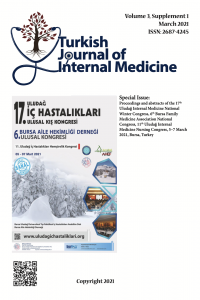Abstract
References
- 1. Gearhardt AN, Corbin WR, Brownell KD. Development of the Yale Food Addiction Scale Version 2.0. Psychol Addict Behav J Soc Psychol Addict Behav. 2016 Feb;30(1):113–21.
- 2. Bayraktar F, Erkman F, Kurtulus E. Adaptation study of Yale food addiction Scale. Klin Psikofarmakol Bul. 2012;22(1):S38.
- 3. Karlsson HK, Tuominen L, Tuulari JJ, Hirvonen J, Parkkola R, Helin S, et al. Obesity is associated with decreased µ-opioid but unaltered dopamine D2 receptor availability in the brain. J Neurosci. 2015;35(9):3959–65.
- 4. Araştırmaları GB, Sosyal Ü, Enstitüsü B, Psikoloji K, Lisans Y, Doktora Programı P, et al. Yeme Bağimliliği. 2018;2(2):54–8.
- 5. Oyekcin D, Deveci A. Etiology of Food Addiction. Psikiyatr Guncel Yaklasimlar - Curr Approaches Psychiatry. 2012;4(2):138. 6. Leigh SJ, Morris MJ. The role of reward circuitry and food addiction in the obesity epidemic: An update. Biol Psychol [Internet]. 2018;131:31–42. Available from: https://doi.org/10.1016/j.biopsycho.2016.12.013
- 7. Brunault P, Ducluzeau PH, Courtois R, Bourbao-Tournois C, Delbachian I, Réveillère C, et al. Food Addiction is Associated with Higher Neuroticism, Lower Conscientiousness, Higher Impulsivity, but Lower Extraversion in Obese Patient Candidates for Bariatric Surgery. Subst Use Misuse. 2018;53(11):1919–23.
- 8. Meule A, Vögele C, Kübler A. Deutsche Übersetzung und Validierung der Yale Food Addiction Scale-German translation and validation of the Yale Food Addiction Scale. Diagnostica. 2012;58:115–26.
- 9. Meule A. Food addiction and body-mass-index: a non-linear relationship. Med Hypotheses. 2012;79(4):508–11.
Abstract
Aim: Although the term 'addiction' was previously used only to describe excessive alcohol and substance abuse, it has recently been realized that some behaviors have a neurobiological basis similar to alcohol and substance addiction. Food addiction is one of these behaviors.
In many studies, it has been suggested that especially obese and overeating people have food addiction (1,2). The aim of our study was to compare the food addiction prevalence among obese and non-obese persons who applied to obesity and family medicine outpatient clinics.
Material-method:
The patients who applied to the Family Medicine outpatient clinic and obesity outpatient clinic between 15.01.2019-30.06.2019 were included in the study. The age, gender, weight, height, and smoking status of the patients were questioned. Yale Food Addiction Scale which was developed by Ashley N. Gearhardt (1) et al and adapted to the Turkish language by Bayraktar (2) et al was conducted on the individuals who volunteer to participate in the study.
Results: 195 patients without obesity and 403 patients with obesity were included in the study. The mean age and body mass index, the distribution of gender, and smoking status of the individuals are shown in Table 1. The food addiction prevalence in the obese group was 33,7% and 14% in the non-obese group. The prevalence of food addiction was significantly higher in obese individuals (p<0,001) (OR 3,13, 95 % Cl 2,09-4,68).
References
- 1. Gearhardt AN, Corbin WR, Brownell KD. Development of the Yale Food Addiction Scale Version 2.0. Psychol Addict Behav J Soc Psychol Addict Behav. 2016 Feb;30(1):113–21.
- 2. Bayraktar F, Erkman F, Kurtulus E. Adaptation study of Yale food addiction Scale. Klin Psikofarmakol Bul. 2012;22(1):S38.
- 3. Karlsson HK, Tuominen L, Tuulari JJ, Hirvonen J, Parkkola R, Helin S, et al. Obesity is associated with decreased µ-opioid but unaltered dopamine D2 receptor availability in the brain. J Neurosci. 2015;35(9):3959–65.
- 4. Araştırmaları GB, Sosyal Ü, Enstitüsü B, Psikoloji K, Lisans Y, Doktora Programı P, et al. Yeme Bağimliliği. 2018;2(2):54–8.
- 5. Oyekcin D, Deveci A. Etiology of Food Addiction. Psikiyatr Guncel Yaklasimlar - Curr Approaches Psychiatry. 2012;4(2):138. 6. Leigh SJ, Morris MJ. The role of reward circuitry and food addiction in the obesity epidemic: An update. Biol Psychol [Internet]. 2018;131:31–42. Available from: https://doi.org/10.1016/j.biopsycho.2016.12.013
- 7. Brunault P, Ducluzeau PH, Courtois R, Bourbao-Tournois C, Delbachian I, Réveillère C, et al. Food Addiction is Associated with Higher Neuroticism, Lower Conscientiousness, Higher Impulsivity, but Lower Extraversion in Obese Patient Candidates for Bariatric Surgery. Subst Use Misuse. 2018;53(11):1919–23.
- 8. Meule A, Vögele C, Kübler A. Deutsche Übersetzung und Validierung der Yale Food Addiction Scale-German translation and validation of the Yale Food Addiction Scale. Diagnostica. 2012;58:115–26.
- 9. Meule A. Food addiction and body-mass-index: a non-linear relationship. Med Hypotheses. 2012;79(4):508–11.
Details
| Primary Language | English |
|---|---|
| Subjects | Internal Diseases |
| Journal Section | Short Report |
| Authors | |
| Publication Date | March 7, 2021 |
| Submission Date | February 6, 2021 |
| Acceptance Date | March 4, 2021 |
| Published in Issue | Year 2021 Volume: 3 Issue: Supplement 1 |



